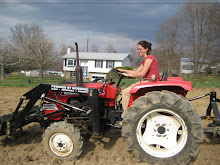There's been a constant little cloud over my head of late - the worry over seeds. They are such tiny little things, it's hard to maintain faith that they will ever come up at all. And sometimes they don't; the earlier drama of the beet seeds is being repeated with other seeds sown of late, even radishes, typically an easy germinater. Not all seeds grow, as was once pointed out to me by the 9-year old daughter of the farmer I worked for in Texas. So true. Some seeds don't grow just because they don't, but other seeds don't grow because some condition isn't quite right.
What's going on?! Well, there's lots of things, but most importantly, and really the only thing that matters, is organic matter. The soil at the upper end of the field where I'm working is fairly heavy, with a high percentage of clay. With the fluctuation in weather from wet to dry it has formed a significant crust on the top of the soil, prohibiting seeds from popping through. This crust also keeps moisture and oxygen from seeping in. In the long term the only thing that can be done is to add more organic matter to the soil which helps it maintain good structure, rather than melting into a crust when it rains. For the immediate needs of the seeds in the ground though I've tried raking at this crust, and irrigating to soften it. This seems to be helping, but I think these efforts came too late.
At this point I've decided it's time to let the majority of those seeds go, and re-seed. It's disappointing, as this means some crops will be later to mature than I'd like, but not putting more seeds in the ground is a dumb reason not to have a good harvest, so I will just carry on and do better with each round of seeds. After talking this issue through with several farmer friends and my housemates, I've come to a better method utilizing extra greenhouse plastic as a cover for the newly seeded beds.
The plastic will help maintain warm, humid conditions until the seeds germinate, at which point I'll remove it and lay it on the next round of seeds. I only have about 90 feet worth of plastic, so I have to stagger my plantings, moving the plastic row by row as I go. I used the plastic last week with some radishes and beets and had excellent results. The radishes are up in a lovely little green line and even the beets have popped up in just six days! Amazing what a little water and warmth can do.
This morning I set to the task of carrots, my favorite, which are especially finicky. They like to be evenly and consistently moist, in a loose, deeply prepared soil. I dug up about 40 feet, mulched it, ran over it with the tiller to make a finer seed bed, raked it into a raised bed, made 3 furrows, sprinkled in the carrot seeds, laid down irrigation lines and then covered it all with a sheet of greenhouse plastic (all the while under the watchful eye of the utility workers fixing the electrical lines at the edge of my field).
The day ended with the realization that the tractor I had borrowed had been stolen! After talking with Jack my neighbor (whose favorite topic is lamenting over stolen things and how the neighborhood has gone downhill) and the sheriff, I called the owner of the tractor to find out exactly the model of the tractor....only to find out that he had come to get it just this morning. Thank goodness. Why I didn't think to call him first I don't know. Had to call the sheriff back, "Hello this is the lady that called a few minutes ago reporting a stolen tractor. Just wanted to let you know everything's fine, it wasn't stolen." A heart-racing but comical experience all in all.
It's one of those "been-a-while" updates....
7 years ago









